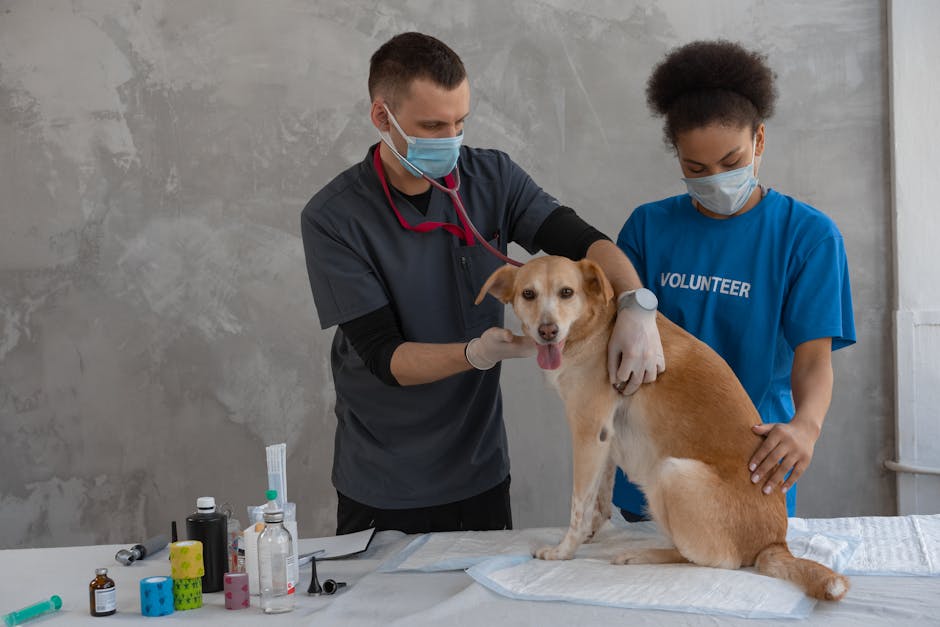Early Disease Detection forms the cornerstone of effective animal healthcare. Many diseases, particularly cancers and chronic conditions like kidney disease or diabetes, often exhibit no overt symptoms in their initial stages. A comprehensive veterinary examination, including physical assessments, blood tests, and urinalysis, can detect these subtle anomalies long before they manifest clinically. This early detection allows for prompt intervention, potentially increasing the chances of successful treatment and improving the pet’s prognosis significantly. For instance, early detection of cancer often allows for less invasive and more effective treatment options, enhancing survival rates and improving quality of life.
Preventive healthcare is another crucial benefit. Veterinary check-ups provide opportunities for preventative measures like vaccinations, parasite control, and dental hygiene. Vaccinations protect against potentially fatal infectious diseases, safeguarding both the individual pet and the wider community. Parasite control, encompassing flea, tick, and heartworm prevention, is vital in preventing debilitating or even life-threatening infestations. Dental check-ups and professional cleaning help prevent periodontal disease, a common and often painful condition in pets that can have systemic consequences. These preventative measures not only avoid costly and stressful emergency interventions but also contribute to a happier and healthier life for your pet.
Addressing behavioral concerns is often overlooked but is a critical aspect of a complete veterinary check-up. Veterinary professionals are trained to recognize signs of behavioral problems, such as anxiety, aggression, or obsessive-compulsive disorders. Early intervention through behavior modification techniques or medication can significantly improve a pet’s quality of life and strengthen the bond between animal and owner. Addressing behavioral issues proactively minimizes the potential for escalating problems and reduces stress for both the pet and the family.
Maintaining a healthy weight is fundamental to a pet’s overall well-being. Veterinarians can assess a pet’s body condition score during routine check-ups, providing guidance on appropriate diet and exercise regimens. Obesity significantly increases the risk of various health problems, including diabetes, heart disease, and joint issues. By monitoring weight and providing nutritional advice, veterinarians play a vital role in preventing weight-related illnesses and promoting longevity.
Nutritional counseling plays a crucial part in maintaining optimal health. Veterinarians can advise on the most appropriate diet based on the pet’s breed, age, activity level, and health status. They can also help identify food allergies or intolerances that may be contributing to skin problems, digestive issues, or other health problems. Providing a balanced and appropriate diet is essential for supporting the immune system and maintaining optimal energy levels.
Senior pet care necessitates a more frequent and comprehensive approach to veterinary check-ups. As pets age, they become more susceptible to a range of health conditions. Regular check-ups allow veterinarians to monitor for signs of age-related diseases such as arthritis, cognitive dysfunction, and kidney disease. Early detection and management of these conditions can significantly improve the comfort and quality of life for senior pets. These frequent visits allow for tailored care plans, ensuring the best possible support during their golden years.
Beyond the immediate health benefits, regular veterinary check-ups offer significant peace of mind for pet owners. Knowing that their pet is receiving regular professional care can reduce anxiety and allow for a stronger bond between owner and animal. The opportunity to discuss any concerns, however minor they may seem, with a veterinary professional provides reassurance and proactive solutions.
Furthermore, the cost-effectiveness of preventative care is often underestimated. The cost of a routine check-up is significantly less than the expense of treating a serious illness that could have been prevented through early detection. A proactive approach to healthcare can ultimately save money in the long run, as well as reducing the emotional distress associated with unexpected illnesses.
In conclusion, regular veterinary check-ups are an essential investment in the health, well-being, and longevity of our beloved companions. They provide a platform for early disease detection, preventative care, behavioral intervention, weight management, nutritional counseling, and senior pet care. These routine visits are not just advisable; they are a crucial aspect of responsible pet ownership, ensuring that our animal companions enjoy happy, healthy, and fulfilling lives. The investment in regular veterinary care is a testament to our commitment to their welfare and an integral part of the human-animal bond.
